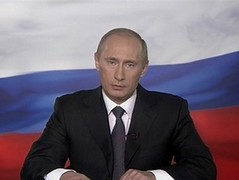Now it is official that Vladimir Putin has crossed a decade of being in power. He was Russia's second president. Now he is a prime-minister. But everybody thinks that he is still in charge of Russia. He entered the executive branch of power when the former president Yeltsin appointed Putin as a prime-minister on August 9, 1999. Since then Putin has become one of the most charismatic as well as one of the most odious world leaders. He made everyone count with Russia's political and economic power. On his watch Russia became one of the BRICs. The Russians praise him for the stability that he brought to the country. An international development community ostracizes his ability to curb individual liberties and media freedom while improving Russia's living standards. The Russians have accepted a trade-off between prosperity and freedom so far. China that is another BRIC also shows that such a tradeoff works in the short-run. The main question is: how long will China and Russia be able to curb individual liberties in exchange for rising living standards?
However, Putin enjoys great public support. His record is not immaculate. A long-lasting war conflict in Chechnya and the Russian-Georgian war demonstrates Putin's imperial appetite. A constant interference in Ukraine's domestic policy is another sign of Putin's imperialism. In 2004 the Kremlin officially backed up Viktor Yanukovich, a presidential candidate from the pro-Russian Party of Regions. And then Putin was the one of the few political leaders who rushed to congratulate Yanukovich with the rigged victory in the presidential elections.
So what does Putin's decade mean for Ukraine that will have the presidential elections in January 2010? The incumbent president Viktor Yushchenko, a conservative democrat, has very low public support. So he's less likely to become a presidential candidate from OUNS party (i.e. Our Ukraine and National Self-defense). Moreover, Russia deals with the current recession better than Ukraine does (see a blog post from July 24). Russia's fall in GDP was smaller than Ukraine's. But the Ukrainians enjoy more freedom than the Russians who in return enjoy higher living standards than the Ukrainians. Let's not forget that Russia's economic growth is not a real value-added growth. It's oil-driven. Russia does what the former Soviet Union did. Russia cashes in oil and gas resources. It has very abundant natural resources and the oil-driven growth can last for a long time. However, I can assure you that a dominating majority of Russians will celebrate Putin's decade. They will toast to his health and happiness. What will Ukraine and the rest of the world do? Let's just hope that Putin's charisma will not reverse Ukraine's political and economic development.

Interesting approach to the question of imperialism. However, I disagree with your statement. I don't think Putin is after Imperialism at all. Instead, I think he is after cash; hence, the political intrigues in Ukraine. The Russian administration cares about its wholly owned state monopoly - Gazprom. It is a child that needs to be nourished and pampered. Therefore, when Ukraine refuses to pay its bills or interrupts transition of the Russian gas to the EU, Russia acts appropriately. The Russian administration is looking for a secure transition corridor for gas, which, unfortunately, Ukraine cannot guarantee. Such instability undermines the company's (i.e. Gazprom's) and individual profits. If Putin and Medvedov were following imperialistic notions, they would have created a different strategy. Economic stability and self enrichment are quiet more important to them, then acquiring new territories.
ReplyDeleteI think that we both have a point. The only difference is that we have different views on the same issue. I look at Putin's foreign policy from a perspective of political economy. And you look at his foreign policy from a macroeconomic perspective or even more narrowly defined perspective of managerial economics.
ReplyDelete